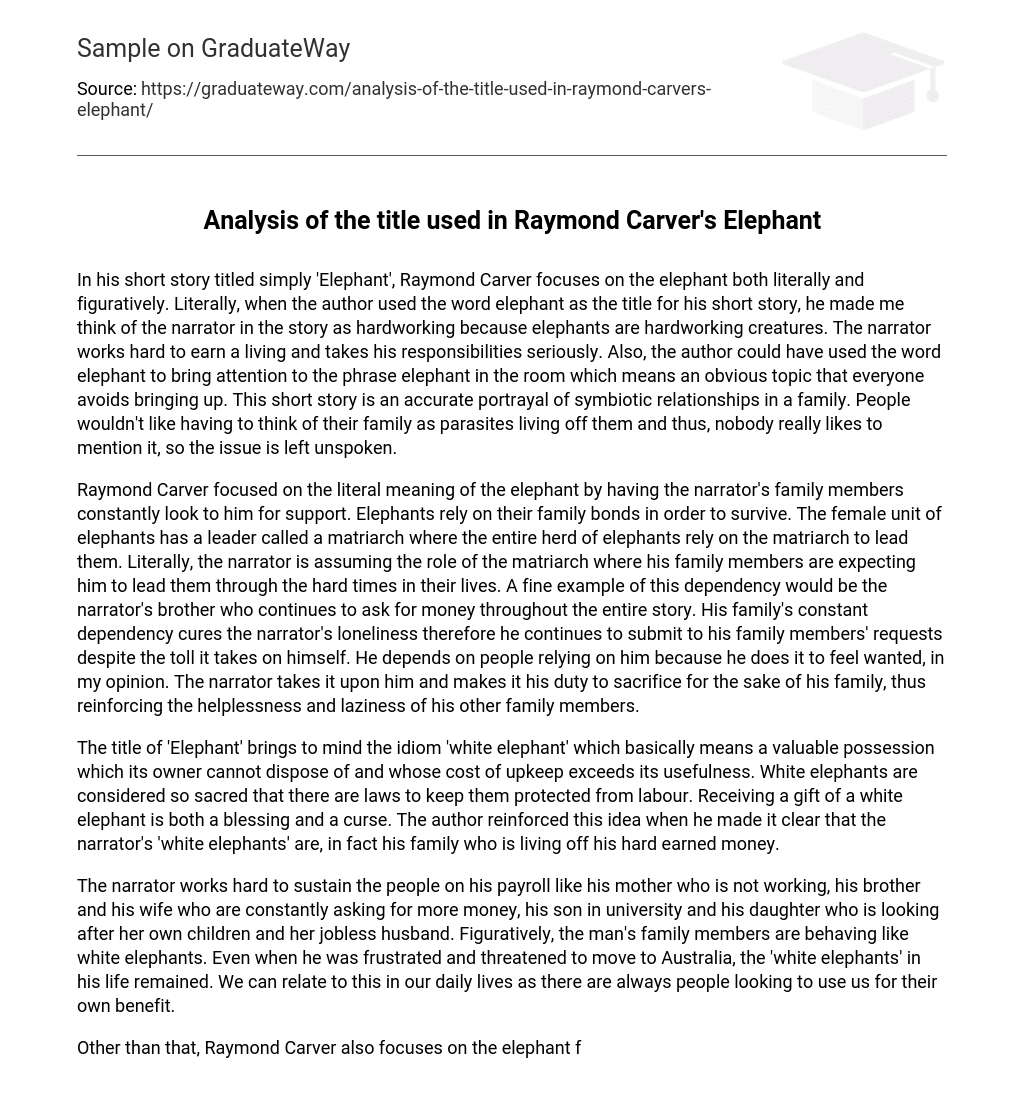In his short story titled simply ‘Elephant’, Raymond Carver focuses on the elephant both literally and figuratively. Literally, when the author used the word elephant as the title for his short story, he made me think of the narrator in the story as hardworking because elephants are hardworking creatures. The narrator works hard to earn a living and takes his responsibilities seriously. Also, the author could have used the word elephant to bring attention to the phrase elephant in the room which means an obvious topic that everyone avoids bringing up. This short story is an accurate portrayal of symbiotic relationships in a family. People wouldn’t like having to think of their family as parasites living off them and thus, nobody really likes to mention it, so the issue is left unspoken.
Raymond Carver focused on the literal meaning of the elephant by having the narrator’s family members constantly look to him for support. Elephants rely on their family bonds in order to survive. The female unit of elephants has a leader called a matriarch where the entire herd of elephants rely on the matriarch to lead them. Literally, the narrator is assuming the role of the matriarch where his family members are expecting him to lead them through the hard times in their lives. A fine example of this dependency would be the narrator’s brother who continues to ask for money throughout the entire story. His family’s constant dependency cures the narrator’s loneliness therefore he continues to submit to his family members’ requests despite the toll it takes on himself. He depends on people relying on him because he does it to feel wanted, in my opinion. The narrator takes it upon him and makes it his duty to sacrifice for the sake of his family, thus reinforcing the helplessness and laziness of his other family members.
The title of ‘Elephant’ brings to mind the idiom ‘white elephant’ which basically means a valuable possession which its owner cannot dispose of and whose cost of upkeep exceeds its usefulness. White elephants are considered so sacred that there are laws to keep them protected from labour. Receiving a gift of a white elephant is both a blessing and a curse. The author reinforced this idea when he made it clear that the narrator’s ‘white elephants’ are, in fact his family who is living off his hard earned money.
The narrator works hard to sustain the people on his payroll like his mother who is not working, his brother and his wife who are constantly asking for more money, his son in university and his daughter who is looking after her own children and her jobless husband. Figuratively, the man’s family members are behaving like white elephants. Even when he was frustrated and threatened to move to Australia, the ‘white elephants’ in his life remained. We can relate to this in our daily lives as there are always people looking to use us for their own benefit.
Other than that, Raymond Carver also focuses on the elephant figuratively by symbolising the narrator as the elephant in the story. The narrator becomes a symbol of leadership, stability and loyalty, which are all noble qualities commonly depicted in the form of an elephant. His family members all look to him for financial help because of his stability in earning money. He also becomes the leader of his family by becoming the one every one relies on. This is evident in the first dream the narrator experiences where it was a flashback to when he was younger and his father was alive. The entire family could depend on the father back then. Thus, the narrator felt as if he was obliged to take on the role of his father, resulting in everyone having to depend on him financially.
In the process of being a martyr, the narrator fails to see that he is being used by his family members. The sacrifices he makes for his family, the cutting back of his own expenses and the stress of it all are not appreciated by his family. Even when he is struggling to make ends meet so he can continue to contribute Herculean sacrifices for his family, he simply cannot cut them off by saying no to all their requests. If he cuts off the money, he will be abandoned and shrouded in loneliness. This particular short story shows the lengths people will go to in order to stave off the loneliness and depicts the immense suffering being lonely brings.





